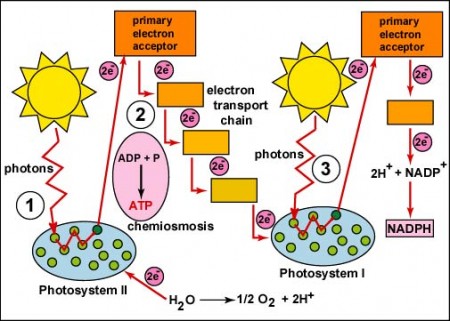Apr
16
A Step Forward of Hydrogen Directly From Algae
April 16, 2013 | 3 Comments
The new research fuels hope of efficient hydrogen production with green algae being possible in the future. The study changes the prevailing skeptical view on the potential of green algae.
One biological way of producing hydrogen from solar energy is using photosynthetic microorganisms whose metabolism uses photosynthesis to split water into hydrogen ions (H+) and electrons (e-). The H+ and e- can then later be combined into hydrogen gas, or common H2, with the use of special enzymes called hydrogenases. This naturally occurs in some cyanobacteria and green algae, which have the ability to use energy from the sun through photosynthesis and produce hydrogen through their native metabolism.
This knowledge that green algae can produce hydrogen under certain conditions has been known and studied for about 15 years, but low efficiency has been a problem. The amount of energy absorbed by the algae is big and the transformed hydrogen is small.
One enzyme activity that has the ability to use sunlight to split water into electrons, hydrogen ions and oxygen is the Photosystem II. Several studies have shown that some of the electrons from the enzyme activity are used to produce hydrogen gas under special conditions. But some study conclusions have stated that most of the hydrogen gas gets its energy from other paths in the metabolism of the green algae. Those studies suggested it is not a matter of actual direct production of hydrogen from sunlight, and that green algae are no more efficient as energy crops than plants.
The Uppsala team found that a considerable amount of the energy absorbed by Photosystem II goes directly into hydrogen production. The researcher team studied in detail how Photosystem II works in two different strains of the green algae Chlamydomonas reinhardtii. By measuring exactly how the amount and activity of Photosystem II varies under different conditions, and thereby affects hydrogen production, they found that a considerable amount of the energy goes directly into hydrogen production.

Photosystem II Illustration. For much more including animations see www.Biologycorner.com/APbiology or click the link in the paragraph above.
Professor Stenbjörn Styring said, “As much as 80 per cent of the electrons that the hydrogen-producing hydrogenases need come from Photosystem II, which is much more than previously believed. This means that most of the hydrogen production is driven directly by solar energy. The discovery gives us hope that it in the future will be possible to control the green algae so that the efficiency becomes significantly higher than it is today.”
Many believe civilization must find a way of producing fuel from renewable energy sources to replace the fossil fuels. Hydrogen is today considered one of the most promising fuels for the future whether used with carbon, or nitrogen for combustion or alone in a fuel cell, or combustion or other processes yet developed or devised.
When hydrogen can be produced directly from sunlight we’d have a renewable and environmentally friendly fuel supply from an endless source of energy.
Free hydrogen from biology seems to be cleared up; the microorganisms can be quite efficient in using sunshine to free up hydrogen. That puts the challenge in the genetic engineers field with a very high result achievement the goal.
Just wait, someone will figure it out. They might even be from Sweden!
Comments
3 Comments so far


This іs а topic that’s close to my heart… Thank you! Exactly where are your contact details though?
You’ve made some really good points there. I looked on the web to learn more
about the issue and found most individuals will go along with
your views on this website.
Why viewers still use to read news papers when in this technological globe the whole
thing is available on net?